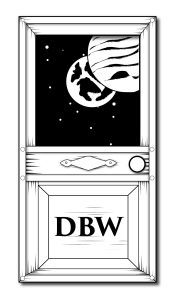 One of my readers suggested that I write about when to use were with a singular subject (heard in the classic song from Fiddler on the Roof: “If I were a rich man…”). Why don’t we sing, “If I was a rich man?”
One of my readers suggested that I write about when to use were with a singular subject (heard in the classic song from Fiddler on the Roof: “If I were a rich man…”). Why don’t we sing, “If I was a rich man?”
The short answer: “If I were a rich man” is written in the subjunctive verb mood. What on earth is that? I wrote the long answer to that question many moons ago, when I first started blogging. Hardly any of my readers have seen that post, since it’s back from the times when my readers were mostly crickets.
So I figured it was time to bring this out again and answer my reader’s question. I hope you enjoy it!
If Wishes Had Genies…
Verbs have moods, just like genies do. And we all know you need to pay attention to someone’s mood if you want to get your wish. (“Can I have a cookie, Mom? Pleeease?” Oh, no, it’s not working! Time for the cute face. “I love you.”)
Disney’s Aladdin shows us all about moods and how we can stay on the good side of verbs. The film’s characters use the three verb moods: indicative, imperative, and subjunctive. Let’s see how each mood can affect your chances of getting your wish.
Indicative Mood
We use the indicative mood most of the time. This verb mood is good for stating facts, making requests, or asking questions. Aladdin uses this mood when he says, “Genie, I wish for you to make me a prince.” The verb in this sentence is wish. This is a simple request, and Genie is happy to lend a hand:
Imperative Mood
We use the imperative mood for commands. Our story’s villain, Jafar, is fond of using the imperative mood. After he steals the lamp, he commands: “Genie, grant me my first wish.” Here, the verb is grant. Jafar could have said, “I would like you to grant me my first wish,” which would have been more polite (and indicative). But no. And guess what happens when you use the imperative mood on a genie?
Subjunctive Mood
This final verb mood is the trickiest. We use the subjunctive mood for unlikely possibilities, things that are not true, and (you guessed it) wishes. You often find the subjunctive mood hanging around with the word if. Aladdin uses the subjunctive when he protects children from being whipped by a rude prince. He says, “Hey, if I were as rich as you, I could afford some manners!”
We can tell this is the subjunctive mood because Aladdin says I were. This can sound strange to our ears, because normally people say I was. With the subjunctive, however, the verb form were is always used (if I were, if you were, if he were, if she were…).
So why is this verb mood important? It tells us that Aladdin thinks he will never be rich. After all, he doesn’t have a genie to help him with that…yet.
Once Aladdin finds Genie, he never uses the subjunctive mood again. Why? Because he knows that his wishes will come true. They are no longer unlikely to happen. So, unlike the rest of us, he doesn’t need to think about when to use the subjunctive mood.
After talking about this, now I really want a genie. I’m sure it would improve my mood. Imagine the possibilities…
***
Images from Disney’s Aladdin
This post is dedicated to my loyal readers from the beginning blog times who are still with me. I hope you enjoyed this blast from the past!
Stay tuned for tomorrow’s (new) post, where I will eXamine the xenophobic letter X…




Look, this is a great post. If I were as good a writer as you, I would have known about the subjunctive mood too. (Or if I had paid attention in English class. I was too distracted, I guess…)
LikeLiked by 1 person
I learned this one in a university grammar class aimed at people working in publishing. Up until that point, I had no idea there was such a thing as a moody verb. 🙂 Once I found out, it was an “aha” moment. Glad I could share it with you, Pat!
LikeLiked by 3 people
Great to read it again! The more often I expose myself to the grammar rule (in a soooo amusing way!) the more entrenched in my brain it gets; ready to be used with a wishful sentence. your loyal cricket 🙂
LikeLiked by 1 person
You know you’re my favourite cricket, Nicole. 😉 Thanks for sticking with me!
LikeLike
Great explanation. I know when to use the subjunctive, it seems to come naturally to me, but have never understood it properly. Now I do!
LikeLiked by 2 people
That’s great, Anabel! I like to understand the “why” behind things. I used to have good instincts but little knowledge of grammar, and I have found that learning the details has made me a better writer.
LikeLiked by 2 people
I really enjoyed this grammar class.
I have learned a lot from you and I’ll go back and thoroughly read all of your posts from this month of “Rogue words A to Z”.
Thanks for your hard work here!!!
LikeLiked by 1 person
Thanks for reading them! And thanks for letting me know you enjoy them, that’s great to hear!
LikeLiked by 1 person
The subjunctive appears FAR more often in Spanish and it’s always difficult for English speakers to learn those “moods” because they are misused so often.
LikeLiked by 1 person
That’s interesting. The use of the subjunctive in English appears to be dying off. I had no idea it was so pervasive in Spanish!
LikeLiked by 1 person
Ooh, this is a good one. It definitely flummoxes me sometimes. I’ll have to keep in mind the mood. Awesome tip. Thank you!
LikeLiked by 1 person
You’re welcome!
LikeLike
I first encountered this mood in french class. It was hard. Still is.
LikeLiked by 1 person
I find we tend to discover more about grammar when we learn other languages than when we learn our own. Hopefully it will get easier eventually, Sonia!
LikeLike
You did a great job on this. I hope I don’t seem like a broken record speaking about homeschooling, but I remember this. I was what some called eclectic. I would do my research on different publisher’s approaches to teaching a specific subject to see which would be best suited for my specific needs. I ended up with a different brand for every subject.
When it came to language arts curriculum my favorite was not only cheaper than all of the others, but was actually the most comprehensive. It was called “Rod and Staff English”, and was published by Mennonites. They went into so much detail explaining things like moods, active and passive voice, and similar topics in their 7th and 8th grade textbooks.
We used to laugh at the sentences they would ask us to diagram. 🙂
LikeLiked by 1 person
Don’t worry about being a broken record! It’s great to hear about your homeschooling experiences. It sounds like more and more parents are going for homeschooling these days.
This reminds me of teaching piano, where you never seemed to find one series of piano books that covered everything you wanted. Sounds like you did a wonderful job with pulling everything together. I’ll have to look into “Rod and Staff English.” When I went through the school system at that age, we didn’t have sentence diagramming or anything about verb moods. Or much of anything about grammar, really!
I’ll bet a lot of those sentences were entertaining. 🙂
LikeLiked by 1 person
This might make you laugh. My son is 27 now, and is a public school teacher. He teaches high school math. I used Rod and Staff for his younger sister, but something else for him. He didn’t care much for English. However, I proofread his papers in his college composition class, and he got an “A”. 🙂
I still make mistakes when it comes to certain punctuation marks, and have a habit of putting periods on the wrong side of quotation marks. 🙂
LikeLiked by 1 person
Good for your son, being a teacher. Obviously he learned a lot from you! 🙂
I think punctuation is the most challenging part of language. Don’t get me started on the comma. 😉 And it doesn’t help that there are different rules around the world. Depending on where you are, punctuation goes either within or outside of quotation marks. So I think you’re doing just fine! 🙂
LikeLiked by 1 person
Hi! You cannot imagine that your post actually attracts fans of Aladdin hahaha. Anyway your post was informative and easy to read. I suppose many Disney fans will enjoy it! Thanks for the post!
LikeLiked by 1 person
Welcome to my blog! It’s always great to meet another Disney fan. I’m so glad you enjoyed the post, and I appreciate you taking the time to let me know! 🙂
LikeLike
This is one that always confuses me. I should pin it to my wall.
LikeLiked by 1 person
There always seems to be that one rule that’s our personal nemesis.
LikeLiked by 1 person
This is possibly my favourite post of the month – I’ve always wondered about was vs were, and your explanation about the subject’s opinion of how unlikely that is makes perfect sense! Thank you!! 🙂
LikeLiked by 1 person
Hurrah! That’s great to hear, especially since I wondered if it might be cheating to reuse a post. 😉
LikeLike
Cool! I often get that mixed up 🙂
LikeLiked by 1 person
Glad I could help!
LikeLike